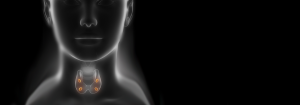What is iodine?
Iodine is a mineral that is required for health. Iodine is found in the diet and it is important to have a good intake of iodine. Iodine is required for the production of thyroid hormones, T4 and T3.
What are thyroid hormones?
The thyroid is a butterfly-shaped gland that is found in the neck. The thyroid gland produces and releases thyroid hormones into the circulation. These hormones are known as T3 (tri-iodothyronine) and T4 (thyroxine). The thyroid hormones are important for regulation of metabolic rate, growth and development.
How much iodine do you need?
The World Health Organisation (WHO) recommendations are in the table below.
|
Population group |
World Health Organisation Recommended Nutrient Intake (RNI) (µg/day) |
|
Children 0-5 years |
90 |
|
Children 6-12 years |
120 |
|
Adults >12 years |
150 |
|
Pregnancy |
250 |
|
Lactation |
250 |
Can you have too much iodine?
Yes, it is important to avoid iodine excess – this can lead to thyroid problems. The safe upper limit is approximately 600 µg/day for adults (>12 years) and pregnant women but individuals with chronic iodine deficiency may adversely react to levels lower than this if their thyroid has adapted to the low supply of iodine.
It is important to note that although seaweed is a concentrated source of iodine, regular consumption of brown seaweeds (e.g. kelp) is not recommended, especially during pregnancy, owing to the potential for excessive iodine intake. Kelp supplements are currently marketed in the UK as a single iodine supplement but should not be used as an iodine source and should not be recommended to pregnant women.
What happens when you don’t have enough iodine?
Goitre develops at low intake of iodine. Goitre is the swelling of the thyroid gland to trap as much iodine as possible from the diet. If iodine deficiency is severe and prolonged, the production of thyroid hormones may be affected and lead to a lack of thyroid hormone.
During pregnancy a low intake of iodine might affect how the baby’s brain develops. If severe deficiency occurs during pregnancy, cretinism can develop. This is a condition that is associated with poor brain development and extreme learning difficulties. You can find out more about iodine in pregnancy on our pregnancy page.
Text written by Dr Mark Vanderpump and Dr Sarah Bath (November 2015)

